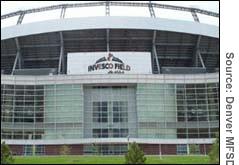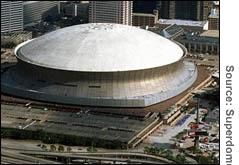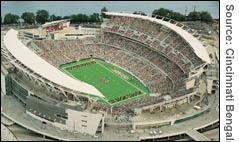|
Cash names the stadium
|
 |
August 24, 2001: 9:19 a.m. ET
Despite fan backlash, corporate names will continue to spread to stadiums
A weekly column by Staff Writer Chris Isidore
|
NEW YORK (CNNfn) - If polls are to be believed, the majority of fans attending the debut game at Invesco Field in Denver Saturday night won't want to be there.
It's not just that football season ticket holders aren't crazy about being forced to buy pre-season tickets to keep their regular-season tickets. It's that most wish that the Denver Broncos and the six-county government entity that built the new $400 million stadium had agreed to keep the beloved "Mile High Stadium" name of the old facility.
People don't mind going to hospital wings or college libraries or art museums named after wealthy benefactors. But sports fans and some sports writers get awfully worked up over the idea that a team and a local government will take millions of corporate dollars to name a new sports facility, or to rename an existing one.
Invesco Funds Group Inc., a unit of British financial services provider Amvescap PLC (AVZ: Research, Estimates), agreed to pay $120 million over 20 years to have the new stadium named Invesco Field at Mile High, with half the money going to the team and half going to the Denver Metropolitan Football Stadium District, which built the stadium.
But even before the deal was struck earlier this year there were howls of protest over the idea of dropping or even obscuring the "Mile High" name. Denver Mayor Wellington Webb came out against the name change, and the Denver Post vowed not to use the Invesco Field name when writing about games and other news of the stadium.
| |

|
|
Invesco Funds may have bought more trouble than they bargained for when they paid $120 million to have their name on the new Denver Broncos home. | |
"Every single person I talked to thought it was outrageous they would sell the name," said John Hickenlooper, a restaurant owner, member of the city's tourism commission and co-founder of a group called Friends of Mile High. "We had a poll done in the six-county area paying the tax for the new stadium, and 69 percent of those we asked said they were willing to pay a higher tax if it meant we kept the name."
A spokeswoman for Invesco said the company did not feel its investment in the new stadium has been hurt by the naming rights controversy.
"We do not regret having done it and in our opinion it has not reduced the value of it," said Molly Cisneros of Invesco. "The naming of the stadium is just a component of a much bigger branding campaign. When you boil down the price we paid on an annual basis, it's a very manageable amount."
More corporate names on the way
The fact that football games will be played this year in PSINet Stadium, Pro Player Stadium and Trans World Dome is proof that slapping your name on a stadium isn't enough to keep your company out of bankruptcy. But Hickenlooper and other traditionalists better get used to the spread of corporate names to other sports stadiums and arenas, despite the general downturn in the advertising market. The dollars just make too much sense for government officials, teams and companies to say no.
Click here to take an online quiz on sports stadiums' corporate names
The Broncos opponent Saturday are the New Orleans Saints, who are expected to soon have a corporate name slapped on their 26-year-old home, the Superdome, while team and state officials weigh whether to renovate or replace the facility.

|
|
|
The 26-year-old Superdome in New Orleans may get a new corporate name in time for the next Super Bowl. | |
Jeff Knapple, CEO of Envision, the company handling the Superdome naming rights negotiations, said the currently depressed advertising market has cut into the rights payments that can be garnered by 10 to 15 percent compared to a year ago.
But it's still a relatively hot market. He said that there are five to six potential buyers for the naming rights to the Superdome already and he believes that virtually all sports facilities will have a corporate name attached to them by the end of the decade.
"The value is easy to substantiate, even in bad times," he said. "The value holds up quite well."
Some stadiums still buck naming trend
There are facilities that are going without corporate monikers, through factors both in and out of the team's control.
| |

|
|
The Cincinnati Bengals passed up corporate money when the team chose the name Paul Brown Stadium for its new home last year. | |
The patron saint of those who hate corporate names should probably be Cincinnati Bengals owner Mike Brown, who not only passed up taking money for naming rights on his new stadium but also compensated Hamilton County, Ohio, for the $5 million that county officials expected to get from naming rights.
Last year his team opened Paul Brown Stadium, named for the Hall of Fame coach who was the team's founder and Brown's father.
Meanwhile, despite two years of looking, the Chicago White Sox have been unable to find someone to pay to rename Comiskey Park, the stadium that opened in 1991 and is named for a former owner.
"There were a couple situations where we got close, but then the stock market worked against us and companies backed out," said one White Sox team official, who spoke on the condition his name not be used.
Companies risk fan backlash
Back in Denver, the controversy has not died even with this weekend's opener. Hickenlooper said members of his group have vowed to pull money out of Invesco Funds and invest with competitors. One Denver Post columnist has taken to referring to the company as Infested Funds.
Knapple worries that rights agreements could be depressed by the current controversy in Denver, especially if it spreads to other markets looking for a new facility name.
"There are politicians everywhere. If someone wants to trumpet it, it hurts," Knapple said.
But other brand experts say the lesson of the Invesco Field controversy is that there are a select few facilities that are just too beloved to risk the backlash of trying to hang a new name on them.
"Do I want to have my name on a new Fenway Park? That may be shaky," said John Antil, a University of Delaware marketing professor, referring to the home of the Boston Red Sox. "There is so much controversy about that, and affinity toward the existing Fenway Park, I'm not so sure I want to be attached to that one."
Hit and run
The PGA Championship produced another exciting finish, but once again the ratings ended up stuck in the rough, further proof, as if any were needed, that the sport's popularity boom of recent years is all about Tiger Woods and not the game itself.
The PGA drew an average rating of 5.2 for the weekend, when Woods struggled far back in the pack after barely making the cut Friday. That's a 26 percent drop in households from a year ago, when Woods won. The British Open saw weekend ratings of 4.1, another 26 percent decline from Wood's 2000 victory, while the U.S. Open saw an average rating of 5.3, down 10 percent from Woods' year-ago win.
The only major tournament to show a gain this year was the Masters, which Woods won after losing last year. The Masters grabbed a 10.7 rating, up 42 percent....
Last week's column on continued financial losses in the WNBA generated a lot of mail from opposite sides of the spectrum.
One set of both female and male writers argued that the women players were fine role models who should be judged solely on the quality of their play. Other male writers argued the only way they would watch WNBA was if players started to display more sex appeal.
Both sides are probably disappointed by the recent news out of Arizona that Phoenix Mercury player Lisa Harrison considered but then turned down an offer to pose naked for Playboy after winning the magazine's Sexiest Babe of the WNBA online poll. Price, not principle, was apparently the reason she said no.....
One player-owner is apparently enough. While Pittsburgh Penguins owner Mario Lemieux kept his ownership job when he returned to the ice this year after a three-year retirement, the Washington Post this week quoted unnamed sources familiar with the situation as saying that former Chicago Bulls star Michael Jordan, a minority owner of the Washington Wizards, would sell back his ownership position in the NBA team if he decides to attempt a comeback. 
|
|
|
|
|
 |

|

